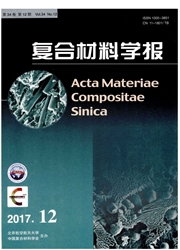

 中文摘要:
中文摘要:
采用一个3D代表体积单元(RVE)微观模型并结合均匀化有限元的方法预测了双向连续纤维增强复合材料的力学性能。假设纤维和基体在其应力达到抗拉强度之前满足线弹性规律。分别分析了纤维/基体弹性模量比、泊松比及其纤维含量的对复合材料宏观力学性能的影响;以及采用内聚力模型分析界面性能对整体力学性能的影响。结果显示:纤维泊松比对复合材料力学性能影响很小;纤维模量对复合材料抗拉强度及面外方向的弹性模量影响较小,但对面内方向的弹性模量影响较大;随纤维含量的增加,宏观弹性模量及面内抗拉强度随之线性增加,而面外抗拉强度有减小趋势;界面的存在会降低复合材料的抗拉强度。
 英文摘要:
英文摘要:
A three-dimensional representative volume element( RVE) micromechanical model is proposed for estimating the effective macroscopic mechanical properties of continuous bidirectional-fiber-reinforced composites by homogenization finite element method.Both the fiber and the matrix in a composite are assumed to be perfectly elastic until reaches tensile strength. The influence of the ratios of fiber / matrix modulus and the fiber volume ratio on the effective modulus and the tensile strength are specifically investigated,and cohesive zone model is introduced to analyze the influence of the interfacial properties on overall mechanical properties. The results showed that the poisson's ratio of fiber has a little effect on mechanics performance of composite; the modulus of fiber is also has a little effect on tensile strength and out-of-plane modulus,while play a more important role in determining in-plane modulus. With an increase in the fiber volume fraction,the in-plane tensile strengths and modulus increase sharply while the out-of-plane tensile strength decreases slightly. The tensile strength of the composite will be reduced because of the existence of interface.
 同期刊论文项目
同期刊论文项目
 同项目期刊论文
同项目期刊论文
 Finite element and molecular dynamics models for predicting effective mechanical behaviors of carbon
Finite element and molecular dynamics models for predicting effective mechanical behaviors of carbon Oscillators based on double-walled armchair@zigzag carbon nanotubes containing an inner tube with di
Oscillators based on double-walled armchair@zigzag carbon nanotubes containing an inner tube with di Homogenized finite element analysis on effective elastoplastic mechanical behaviors of composite wit
Homogenized finite element analysis on effective elastoplastic mechanical behaviors of composite wit 期刊信息
期刊信息
